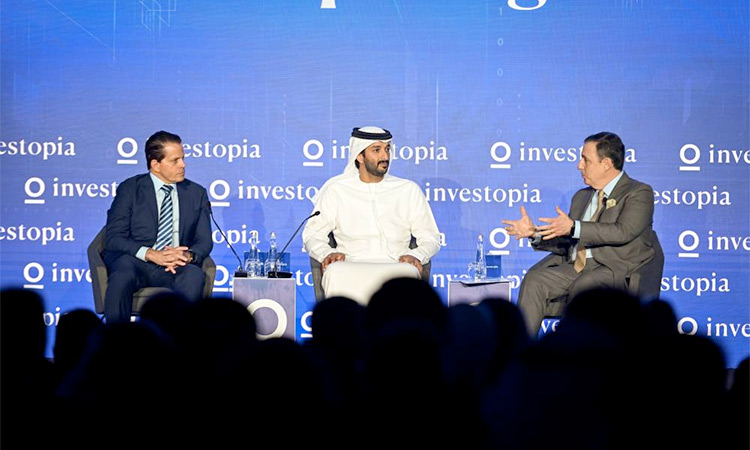UAE is a key player in Global Value Chain, stresses minister

Dr Thani Al Zeyoudi speaks during a session at Investopia Conference 2023 in Abu Dhabi.
The discussion was led by Dr Thani Al Zeyoudi, Minister of State for Foreign Trade, UAE, Chris Cox , Global Head of Trade and Working Capital Solutions, Citi, Samaila Zubairu , President & CEO, Africa Finance Corporation, and James Zhan , Senior Director, Investment & Enterprise, UNCTAD.
Dr Thani Al Zeyoudi discussed a question by the session moderator Maria Ramos about the impressive 78% year-on-year growth in trade figures for the country. He also pointed out that the global reshuffling of economic gravity is providing an opportunity for the UAE to position itself as a key player in the global value chain. Furthermore, the rise of protectionism around the world, accelerated by the pandemic, is expected to cost around $3 trillion by 2025 to the global economy. To avoid the negative impact of these trends, the UAE is redefining supply chains and forging new partnerships.
He added that in 2021, the UAE achieved a remarkable 17% growth in trade figures, reaching a total of Dhs2.3 trillion. The country also established three new trade agreements with partners, in addition to existing agreements within the Arab world. Furthermore, Dr Al Zeyoudi emphasized the UAE’s commitment to sustainability, stating that 25% of all power in the country comes from clean energy sources, and 75% is considered one of the cleanest conventional sources of energy. Dr Al Zeyoudi expressed his trust and confidence in the UAE’s ability to continue attracting investments and achieving strong trade growth in the coming year.
Meanwhile, Samaila Zubairu, CEO of the Africa Finance Corporation, highlighted the growth of the electric mobility market to $50 billion by 2050, and the need for 2.5 million tonnes of minerals and metals for electric vehicles and batteries, many of which are located in Africa. He emphasised the need to improve processing and bring voluntary carbon markets to life during COP28, and encouraged companies to participate in achieving net zero targets.
Chris Cox, Global Head of Trade and Working Capital Solutions at Citi, spoke about the challenges of the global supply chain, and emphasized the importance of digitization and logistics incentives, as trade remains fragmented. Cox also highlighted the significant growth in supply chain financing solutions. Cox mentioned the importance of supporting SMEs through development agencies focused on sustainability, and Citi’s commitment to increasing the pool of capital available to them.
According to James Zhan, Senior Director of Investment and Enterprise at UNCTAD, global trade can be harnessed for sustainable growth through investment. Despite the recent trends of slowbalization and fraglobalization, there is still demand for climate transformation and rapid growth in financing. Policy-driven investment, such as the EU’s $300 billion investment and the US’s efforts in Africa, is driving things forward.
Separately, global experts discussed, in a session titled “Growth Opportunities in Times of Decarbonization”, diversification and innovation, economic growth and job creation for a healthier climate, at the Investopia Conference 2023.
The discussion led by Mrs. Lieve Mostrey, Chairperson and CEO, Euroclear; and Sanjeev Gupta, Executive Chairman, GFG Alliance, touched upon how transition to net-zero emissions will be slow due to fast-growing emerging markets. The challenge of achieving net-zero emissions by 2050 is a topic of great importance leading up to COP28. The discussion often focuses on what this means for consumers and industries, but it is equally important to consider how we can accelerate the pace of decarbonization.
The panellists as well focused on the key challenge in finding ways to clean up production processes for industries like steel and aluminium. There is currently a lot of investment in hydrogen, particularly in the building sector.
During the panel discussion, Lieve Mostrey highlighted that Euroclear is a financial market infrastructure with 36T EUR worth of securities on their books and annual transactions over a quadrillion Euros, which connects people and companies in need of funding with international investors. They are able to accelerate foreign direct investment at a cheaper cost and provide ESG data to investment funds to support investments in the ESG space. Mostrey pointed out that Euroclear can contribute to funding cycles that accelerate the transition and facilitate between western and developing markets, especially green issuance, in a leaner, more certain, and safer way. This can help address the needs of developing countries, including the need for a $100 billion lost and damage fund to accelerate the transition, particularly in Africa.
Sanjeev Gupta discussed the challenges in the steel industry due to its high carbon emissions. With India’s population continuing to grow, there will be an explosion of demand for steel, further adding to global emissions. Gupta emphasised the need for a solution, such as shifting from coal to natural gas and hydrogen.
In conclusion, Lieve Mostrey and Sanjeev Gupta expressed their commitment to contributing to the decarbonization efforts required for a sustainable future.







